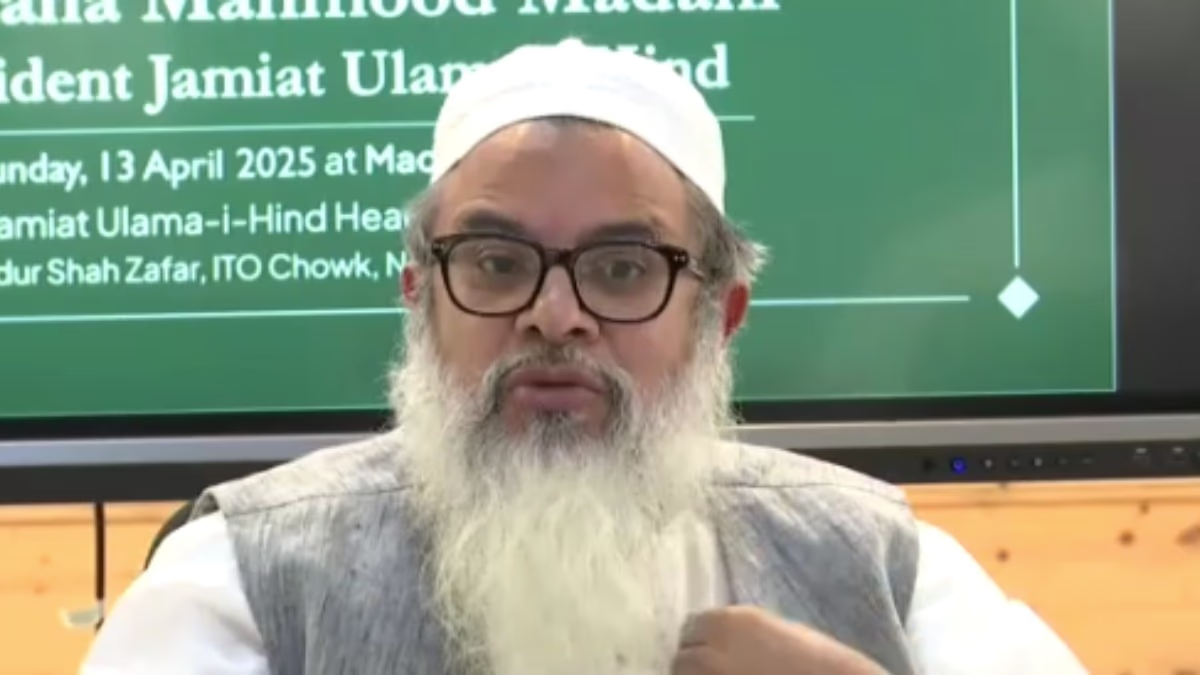After a meeting of the Jamiat Ulema-e-Hind, its president Maulana Mahmood Madani voiced concerns over changes in the Waqf law. In a press briefing, Madani accused the law of being against the interests of society and the Muslim community. Supporting Asaduddin Owaisi's opposition, he called on all organizations to show their strength. During the conference, a question regarding violence in Murshidabad provoked an agitated response from Madani.
Maulana Mahmood Madani's Statement on Waqf Law
The BJP and its supporters, through media, suggested that if the old Waqf laws remained, the Waqf Board would have unrestricted freedom. Even earlier, Waqfs were established with no role for the Muslim society. Regardless of the party in power, it would form the Waqf Board with members of its choosing. Despite changes, this remains true. Parties that once accused Muslims of land grabs now blame us for the same. This is about politics, not just Waqfs.
Madani’s Reaction to Aaj Tak's Question
When Aaj Tak queried about the violence in Murshidabad, Madani was incensed. He retorted, asking, 'The questions you're asking me should be directed at Home Minister Amit Shah—why is Murshidabad burning? Will Muslims always be blamed?'
Objections to the Law
This law benefits neither society nor Muslims. Previously, illegal occupants faced criminal charges, which the new law abolishes. This seems to benefit builders.
Reference to the Freedom Struggle
We are citizens of this nation and have fought for its freedom. The founders of independent India made commitments, but now our voices go unheard.
Read also: 'BJP made black laws, will protest on April 19' - Owaisi on Waqf Law
The Struggle Continues
The fight isn't over; sacrifices will be made as before. We'll fight as needed and exercise patience awaiting justice.
The Country's Atmosphere
The people of this nation are wonderful, but some seek to lead it astray. Change is inevitable.
Madani's Response to Owaisi's Protest Call
Asaduddin Owaisi, chief of AIMIM, called for protests against the Waqf law. In response, Madani urged organizations to seize opportunities to exert their influence where possible.
Proposals on Waqf (Amendment) Act 2025
The Jamiat Ulema-e-Hind's executive council expressed grave concerns during its meeting on April 13, 2025, over the Waqf (Amendment) Act, 2025. This act violates multiple constitutional provisions such as Articles 14, 15, 21, 25, 26, 29, and 300-A, while also attempting to undermine the Waqf's fundamental structure. A particular concern is the nullification of 'Waqf by user,' jeopardizing historic religious sites used as Waqfs. According to government reports, over 400,000 such properties exist.
Read also: Ground Report: 'Houses burned, poisons mixed in water...' 500 flee Murshidabad, seeking refuge in Maldah schools
Objection to Non-Muslim Appointments
Opposition was voiced over appointing non-Muslims or majorities to the central Waqf council and state Waqf boards, interpreting it as undue interference in religious matters, violating Article 26 of the Indian Constitution. This law exemplifies majority dominance, wholly opposed by us and unacceptable under any circumstances.
Attempt to Erase Religious Identity
This executive committee asserts that the current government is violating the spirit and core concept of India's Constitution. We understand this as a systemic and malicious attempt to marginalize the Muslim community, erase their religious identity, and reduce their citizens to second-class status.
Challenge in the Supreme Court
The executive committee appreciates that Jamiat Ulema-e-Hind's president, Maulana Mahmood Asad Madani, has challenged the law in the Supreme Court, urging the hiring of senior lawyers for its effective advocacy.
Maintaining the Religious Nature of Waqfs
This assembly demands the immediate withdrawal of the Waqf Act 2025 by the Indian government, recognizing that Waqf is an essential part of Islamic law derived from the Quran and Hadith, akin to other religious practices. No amendment that affects the religious character or Shariah basis of Waqf is acceptable. Intended amendments should focus purely on administrative reforms, as seen in some previous amendments.
Denouncing Deceptive Statements
The assembly demands that the government refrains from interfering in Shariah matters and creates laws that secure Waqf protection and restore its properties.
Read also: Burnt homes, burning buses, and chaos on the streets...10 images showing Murshidabad alight protesting the Waqf law
Concurrently, the executive committee denounces in strong terms misleading statements by the government and opposition regarding Waqf properties and proposed amendments, vowing to take all measures possible to present the correct narrative before the nation, countering media propaganda.
Right to Peaceful Protest
Peaceful protest is a fundamental constitutional right. No government has the authority to suppress it. Preventing demonstrations against the Waqf Act, legal repercussions against protesters, and administrative violence are highly condemnable. Similarly, violence during protests is deeply disappointing. Such elements only weaken the movement to protect Waqf.
A Call for Prayer and Unity
This assembly appeals to all faithful to avoid sins and evil, and engage in fervent prayers to Allah.




